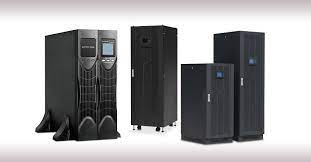Exploring the Different Types of UPS Systems for Uninterrupted Power
In today's interconnected world, where businesses heavily rely on technology, ensuring a continuous power supply is paramount. Uninterruptible Power Supply (UPS) systems play a crucial role in safeguarding sensitive equipment and preventing data loss during power outages. In this article, we'll delve into the various types of UPS systems, understanding their functionalities, benefits, and use cases.
Understanding the Importance of UPS Systems
Imagine being in the middle of an important video conference, and suddenly, the power goes out. Such disruptions can lead to data loss, downtime, and financial losses. This is where UPS systems come into play. These devices act as a bridge between the main power supply and critical equipment, providing instant power backup during outages and fluctuations.
Different Types of UPS Systems
1. Offline/Standby UPS
The Offline or Standby UPS is the simplest form of UPS system. It detects power disruptions and quickly switches to battery power. This type is suitable for non-critical applications like home computers and personal devices.
2. Line-Interactive UPS
The Line-Interactive UPS offers more advanced features than the offline UPS. It regulates voltage fluctuations without immediately switching to battery power. This type is ideal for small businesses and home offices.
3. Online/Double-Conversion UPS
The Online UPS, also known as Double-Conversion UPS, provides the highest level of protection. It constantly powers equipment from the battery and offers seamless protection against all power anomalies. Data centers, medical facilities, and critical infrastructure rely on this UPS type.
Benefits of Different UPS Types
Each UPS type offers specific advantages:
- Offline UPS: Cost-effective solution for basic protection.
- Line-Interactive UPS: Voltage regulation and battery backup.
- Online UPS: Maximum protection against all power issues.
Choosing the Right UPS for Your Needs
Selecting the right UPS depends on factors such as load capacity, runtime requirements, and the criticality of equipment. Conducting a thorough assessment of your power needs helps in making an informed decision.
FAQs About UPS Systems
Q1: Can I use an Offline UPS for my gaming setup?
A: Yes, an Offline UPS can provide basic power backup for your gaming rig.
Q2: Is an Online UPS suitable for home use?
A: While effective, an Online UPS might be overkill for regular home use.
Q3: How do I calculate the required UPS capacity for my business?
A: Calculate the total wattage of connected equipment and estimate the required runtime during outages.
Q4: Can I plug multiple devices into a UPS?
A: Yes, but be mindful of the total load capacity to avoid overloading the UPS.
Q5: What maintenance do UPS systems need?
A: Regularly check battery health and ensure proper ventilation for optimal performance.
Conclusion
In a world where uninterrupted power is crucial, UPS systems provide the necessary protection to keep businesses running smoothly. Whether you're a homeowner, a small business owner, or managing critical infrastructure, understanding the different types of UPS systems empowers you to make the right choice for reliable power backup.

